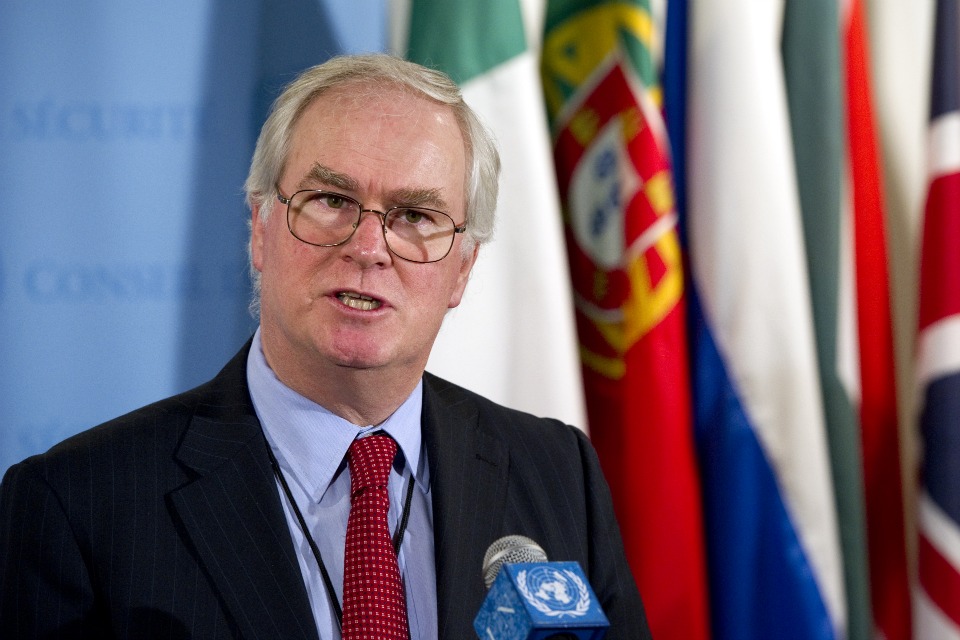"The UK will continue to support security sector reform around the world"
Statement delivered by UK Ambassador Mark Lyall Grant To the UN Security Council debate on Security Sector Reform

Thank you, Mr Foreign Minister for initiating and chairing this important debate. I would also like to thank the Secretary-General for his informative briefing earlier today.
Mr President,
When people are asked to rank what is most important to them, they respond that personal safety and security, and trust in those providing that security are the highest priorities. Today, we recognise this fact with the adoption of the first ever Security Council resolution on security sector reform. The United Kingdom is pleased to co-sponsor this resolution.
When citizens are safe, countries are able to recover from conflict and grow their economies. Sierra Leone and Timor Lesté are successful examples of how the patient work of reforming a country’s security sector – as part of a broader effort to strengthen the rule of law - is fundamental to those countries’ growth.
Conversely, in many of the countries in which we have seen a relapse into conflict – such as the Central African Republic and South Sudan - the collapse or mismanagement of the security sector is often a major contributor to the violence.
Mr President,
One of the most acute challenges facing the United Nations on security sector reform is how to take forward such reform when there has been a complete collapse in state authority, where political legitimacy remains contested, and where serious violence persists. In places such as Libya, Somalia and the Central African Republic, UN missions are grappling with security sector reform challenges in extremely fragile contexts.
Our end goal should be to help build capable, accountable and responsible security sectors, with full national ownership. But in the early stages of a reform process we need to be realistic about what is achievable and prioritise and sequence interventions accordingly.
In violent and unstable contexts, security cannot wait for security sector reform. The immediate focus must be on reducing violence and protecting civilians. We must seek to stabilise the situation in the short-term, while working to create the conditions for a sustainable political settlement and the longer term reform of the security sector.
Too often, we embark on wholesale reform of the security sector when the requisite political pre-conditions do not exist. We train, man and equip security forces, without considering how that will impact the fragile political balance in the country or how those security forces are perceived by the citizens they are entrusted to protect. At times, our eagerness to “get something done” means we do more harm than good, and contribute to further instability.
We can avoid these mistakes. Firstly, as a Council, we have a responsibility to provide missions with clearer, more credible mandates that are better sequenced and prioritised by the most urgent security-related needs. In the early phases of a mission’s deployment, we should not aim for expansive security sector reform activities. We must focus on the most urgent issues to stabilise the situation.
Secondly, missions cannot afford to de-link their good offices and political functions from their security sector reform tasks. The two are intimately linked. The Secretary-General’s Special Representatives should work to generate the political space for security sector reform and gain commitments from leaders to drive forward that reform. Similarly, swift action in the security sector to reduce violence, protect citizens and build trust between citizens and state authorities can help reinforce ongoing political processes and national dialogues. If managed well, these efforts can be mutually reinforcing.
And thirdly, UN missions cannot successfully take forward security sector reform alone. Effective interventions in the security sector must employ the full UN toolbox: political, security, peacebuilding and development. To do this, we must strengthen the internal mechanisms within the UN, both in the field and at headquarters, to coordinate security sector reform activities. In addition, the United Nations needs to deepen its partnerships with regional organisations such as the African Union and European Union who can play an important role in delivering key security sector reform tasks.
Mr President,
The United Kingdom will continue to support security sector reform around the world. We have kept our promise to spend 0.7% of our gross national income on overseas aid. We are the only G20 country to do so. At least 30% of that aid will be spent in conflict-affected states. Over the last decade, we have committed 287 million dollars to support security and justice programmes in twenty-five countries, across various regions of the world. For example, in the DRC, a UK programme has helped to improve the capacity and accountability of the Congolese National Police and of the internal security sector, with a particular focus on the needs of women and girls. The United Kingdom treats security and access to justice as a basic service, on a par with health and education, and a fundamental right as recognised in the Universal Declaration on Human Rights. In all of the UK’s security and justice activities, we take a people-centred approach, focusing not only on state security but also on how individuals experience insecurity and access justice.
Mr President,
I thank you again for convening this debate and for tabling this important resolution. Building accountable, responsive and capable security services in countries recovering from conflict should remain a priority for this Council, so that everyone everywhere can live safely and free from violence.
I thank you.